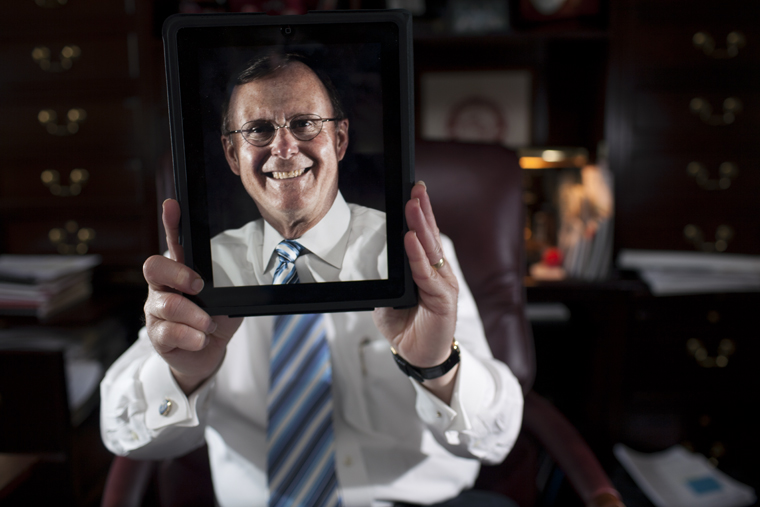iPads promoting paperless meetings
April 19, 2011
President Gary Ransdell last Friday scrolled through the apps on his iPad, which, when the screen is locked, shows a worn area where the device’s heavily used keyboard appears.
The sound of “bloop, bloop” interrupted his speech. One noise alerted Ransdell of an email from a group of university presidents discussing tuition hikes. Another regarded a conference call for the Bowl Championship Series for which he represents the Sun Belt Conference.
Ransdell said he hadn’t used an actual computer that day except to take a survey in the morning.
“I just use my iPad for everything I possibly can,” he said.
Ransdell and some of his senior administrators, which includes division vice presidents and the provost, have used iPads for about a year.
The devices were paid for by the administrators’ division budgets and were bought for two main reasons: to make meetings paperless and to keep administrators ahead of the technology curve.
“I’ve tried to encourage them to lead by example,” Ransdell said. “If we want our students to be technologically current, we should be as well.”
Bob Owen, vice president for Information Technology, said about half the administrative council uses iPads, while the other half uses laptops during meetings.
“The whole idea is being electronic,” Owen said.
But iPad use isn’t limited to just the weekly meetings, as Ransdell will attest to.
Among his favorite apps are Facebook and National Geographic. Ransdell has a few games, including Angry Birds and Paper Toss, and he stores more than 100 songs on the device.
When Ransdell travels, he doesn’t take a computer — just his iPad — and uses it for everything from reading to accessing email and maps, the latest of which he still had from an April 9 visit to see WKU Army ROTC cadets in Fort Campbell.
Deborah Wilkins, chief of staff and general counsel, has been assembling the agenda for administrative council meetings digitally since January.
Wilkins said in the past, matters discussed at meetings likely resulted in stacks of papers inches thick that were read once and immediately thrown away or recycled.
Ransdell said making the meetings completely paperless is still a work in progress.
“I’m probably the worst,” he said, laughing. “I usually show up with a bunch of stuff anyway.”
Attempting to run a paperless meeting has brought about other benefits, such as the ability for council members to access documents, memos and reports while out of town or away from campus. Owen said Information Technology set up a shared folder for administrators to store those files.
Wilkins said “the jury is still out” on whether the new system is a good way to operate.
“But we’re working on it,” she said. “We’re trying to get away from all the paper.”













![Students cheer for Senator at Large Jaden Marshall after being announced as the Intercultural Student Engagement Center Senator for the 24th Senate on Wednesday, April 17 in the Senate Chamber in DSU. Ive done everything in my power, Ive said it 100 times, to be for the students, Marshall said. So, not only to win, but to hear that reaction for me by the other students is just something that shows people actually care about me [and] really support me.](https://wkuherald.com/wp-content/uploads/2024/04/jadenmarshall-1200x844.jpg)


![Students cheer for Senator at Large Jaden Marshall after being announced as the Intercultural Student Engagement Center Senator for the 24th Senate on Wednesday, April 17 in the Senate Chamber in DSU. Ive done everything in my power, Ive said it 100 times, to be for the students, Marshall said. So, not only to win, but to hear that reaction for me by the other students is just something that shows people actually care about me [and] really support me.](https://wkuherald.com/wp-content/uploads/2024/04/jadenmarshall-600x422.jpg)








